No Results Found
The page you requested could not be found. Try refining your search, or use the navigation above to locate the post.
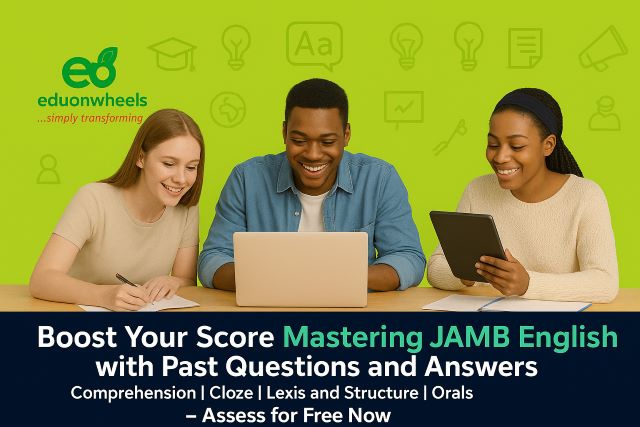
The page you requested could not be found. Try refining your search, or use the navigation above to locate the post.
Are you a JAMB UTME candidate in Nigeria struggling to master the Use of English section? You’re not alone! The English Language paper is a compulsory requirement for all candidates, making it a critical factor for securing university admission across Nigeria. To help you achieve a high JAMB score and ensure your exam success, Eduonwheels offers the best of JAMB exam success guide: our FREE 2021 JAMB UTME English Language Past Questions and Answers.
Stop wasting time searching for unreliable materials. Our comprehensive resource provides authentic 2021 JAMB past questions with detailed, easy-to-understand answers and explanations. Practicing with actual questions from the 2021 UTME is the most effective way to understand the exam’s format, identify your weak areas, and build the confidence you need to ace the test. Whether you’re in Lagos, Abuja, Port Harcourt, or anywhere else in Nigeria, access your free study guide today and take the definitive step towards securing your admission!
You can watch this video on JAMB CBT English 2019 Past Questions 1 – 24 for detailed explanations and solutions to the 2019 JAMB CBT Use of English Language Past Questions.
Unlock your success in the 2021 JAMB Use of English exam with free past questions and answers from Eduonwheels. Join thousands of Nigerian students boosting their scores! Images:1
Questions: Numbered 1 – 100
Passage I
Read the passages below and answer the questions that follow:
Everyone is tired or fatigued at some time. The major cycle in your life is work, fatigue and rest in that order. Fatigue is characteristic of your body. It does not occur in a man-made machine which operates as long as its parts are intact and it has fuel. But your body, a living machine, has a definite limitation – its work continues, it gradually loses its responsiveness, becomes less irritable, turns out less work and finally may not respond at all.
The feeling of fatigue usually expresses itself in three ways: first, there is a feeling of tiredness and a marked desire for rest. Second, efficiency is greatly reduced. Third, there may be definite physiological changes in your body, low blood pressure, loss of muscle tone, tremors, and poor muscular coordination, and in other ways.
Fatigue, however, may express itself in many ways for there are many different forms of it. The fatigue of a student, for example, who has worked all evening on a difficult lesson, is different from that of a labourer who has worked all day at a back-breaking task, or that of a business executive who worries with the stress and strain of organisation.
Questions: 1 – 5:
1. A suitable title for the passage is
A. Knowing fatigue
B. Fatigue
C. Tiredness and fatigue
D. Body machine
2. According to the passage, the worst stage of fatigue is
A. feeling of tiredness
B. poor muscular coordination
C. reduced efficiency
D. desire for rest
3. It can be inferred from the passage that
A. every task can eventually result in fatigue
B. only difficult lessons lead to fatigue
C. a labourer must work all day before expressing fatigue
D. rest is needed only when you experience fatigue
4. It is advisable that one should rest once
A. there is a feeling of tiredness
B. there is no longer interest in the task
C. there is onset of physiological changes in the body
D. the task becomes difficult
5. (Definite limitation) used to describe the human body in the passage means that
A. the body cannot be made to work continuously like a machine
B. the body should only perform simple tasks
C. body parts must be limited
D. the body is equal to man-made machines
Passage II
Read the passages below and answer the questions that follow:
It is normal in Nigeria to use proficiency in the use of English language as a barometer for evaluating the height of any person’s educational attainment. Today, many teachers resort quite often to the use of vernacular in the teaching of their subjects. One is often dismayed at the incompetence of many teachers, even graduates in the use of English language.
Throughout the colonial period, up to 1960, Nigerian formal education was patterned after the English system. The “accent” was on English and an educated Nigerian was one who was only African in colour but English in thought and culture. The ability to speak English fluently and if possible with an Oxford accent was the hallmark of excellence even if the speaker was empty of thought and ideas. In those days it was a serious offence for a secondary school boy or girl to “laugh in the vernacular”.
But we now swung to the other extreme. Nigeria would say they are not English people, some would say they did not specialise in English in the university. But the country has adopted the English language as its official, the language of instruction at schools, parliamentary proceedings, conduct of official business and indeed the lingua franca. If the language is to continue to be used, then it is imperative that we all agree on the pattern of correctness in the language so that communication can be effective.
Questions: 6 – 10:
6. A suitable title for the passage is
A. English language
B. Trends in Nigerian Education
C. Teaching and Learning English
D. Importance of English
7. Which of the following is not true according to the passage?
A. the competence level in the use of English has fallen greatly
B. what used to be in the past could be considered extreme
C. the writer is advocating for the use of indigenous language for teaching and learning
D. English language is the official language in Nigeria
8. During the colonial period, according to the passage, an educated Nigerian was one who
A. has travelled to Oxford
B. is English in thought and culture
C. looks African in colour
D. has the English accent
9. From the passage, it is evident that
A. we need to agree on the pattern of correctness in the use of English language
B. fluency in English leads to empty thought and ideas
C. Nigerians would say they are not English people because they hate the language
D. Every undergraduate needs to specialise in English
10. Considering it a serious offence to “laugh in vernacular” as indicated in the passage, can be viewed as
A. normal
B. extreme
C. correctness
D. proper
In the passage below, the numbered gaps (11-20) indicate missing words. From the options lettered A-D, choose the most appropriate option.
The head of the -11- is called the queen bee. She is -12- than the rest of the bees. Her main task in the colony is to lay eggs. Most of the other bees are the -13- bees. These bees collect nectar and -14- from flowers. The nectar that is carried by the worker bees is deposited on the hive and then -15- into honey. The worker bees also help to look after the young bees. As soon as they are -16-, the worker bees feed the young bees with pollen and nectar. The third type of bee found in the colony is the -17- or male bee. The main task of such a bee is to -18- with a new queen. The queen bee has a life span of about three years. During this period, she would have -19- more than half a million eggs. When the queen bee is dying, a new queen would be groomed. This new queen will eventually take over the duties of the old queen when the -20- dies.
11. In question number 11 above choose the best option from letters A-D that best complete the gap
A. house
B. colony
C. settlement
D. abode
12. In question number 12 above choose the best option from letters A-D that best complete the gap
A. larger
B. enormous
C. thicker
D. older
13. In question number 13 above choose the best option from letters A-D that best complete the gap
A. servant
B. maid
C. worker
D. errand
14. In question number 14 above choose the best option from letters A-D that best complete the gap
A. fruits
B. seed
C. pollen
D. grains
15. In question number 15 above choose the best option from letters A-D that best complete the gap
A. filtered
B. converted
C. refined
D. cooked
16. In question number 16 above choose the best option from letters A-D that best complete the gap
A. born
B. hatched
C. transformed
D. raised
17. In question number 17 above choose the best option from letters A-D that best complete the gap
A. alpha
B. adult
C. drone
D. chief
18. In question number 18 above choose the best option from letters A-D that best complete the gap
A. mate
B. sleep
C. romance
D. protect
19. In question number 19 above choose the best option from letters A-D that best complete the gap
A. laid
B. born
C. delivered
D. produced
20. In question number 20 above choose the best option from letters A-D that best complete the gap
A. former
B. latter
C. earlier
D. bee
Choose the most appropriate option nearest in meaning to the word(s) in (brackets and italics).
21. He maintained that Nigerians need a leader with (an iron fist)
A. fist made of iron
B. severe in treatment
C. difficult to please
D. strong as iron
22. The emphasis placed on good moral conduct by the society in the past seems to have been (relaxed)
A. avoided
B. improved
C. weakened
D. outdated
23. The matter was considered a (private) concern of the chairman to handle
A. personal
B. known
C. public
D. open
24. He was underrated at the (preliminary) stage of the competition
A. advance
B. initial
C. selection
D. crucial
25. The office assistant was dismissed for (pilfering)
A. fighting
B. incompetence
C. stealing
D. mismanagement
26. Almost everyone she had worked with took advantage of her (meekness)
A. gentleness
B. weakness
C. steadfastness
D. generosity
27. Barely six months after his father’s demise, he has nothing left again of his (patrimony)
A. inheritance
B. property
C. reputation
D. valuables
28. His grandfather was one of the few (patriotic) Nigerians who ever lived
A. obedient
B. lover of
C. calculative
D. careless
29. Many people believed that such an action is (unbecoming) of a leader
A. forthcoming
B. not befitting
C. unwanted
D. not necessary
30. The governor was (incoherent) in his speech
A. uncoordinated
B. talkative
C. confused
D. eloquent
Choose the option nearly opposite in meaning to the word(s) in (brackets and italics).
31. The lady has devised a means of (tackling) her current challenges
A. attacking
B. avoiding
C. handling
D. suspending
32. One hundred and forty kilometres per hour is a (reasonable) speed limit
A. acceptable
B. unbelievable
C. outrageous
D. detestable
33. The annual festival attracts (dignitaries) from both home and abroad
A. spectators
B. celebrities
C. chieftains
D. nonentities
34. The soldiers were (remorseful) for their inhuman treatment of the civilians
A. boastful
B. sad
C. successful
D. reliable
35. Insecurity has (escalated) since the present government came into power
A. abated
B. increased
C. proliferated
D. metamorphosed
36. It is (embarrassing) to accept our mistakes and tender an apology
A. acceptable
B. honourable
C. detestable
D. pardonable
37. The lawmakers are perceived to be the (greediest) set of politicians
A. Most selfless
B. Most unwanted
C. Most popular
D. Most corrupt
38. James found the photocopied material (invaluable) while preparing for the examination
A. Valuable
B. worthwhile
C. worthless
D. important
39. Mr. Akin’s health has greatly (degenerated) in the last week
A. improved
B. deteriorated
C. expanded
D. abated
40. The incumbent president (conceded) defeat before the final result was announced
A. accepted
B. rejected
C. opposed
D. challenged
Choose the option with the correct spelling from the options lettered A-D.
41. Choose the option with the correct spelling from the options lettered A-D
A. Interprete
B. Interpret
C. Inteprete
D. Interprette
42. Choose the option with the correct spelling from the options lettered A-D
A. Sucesful
B. Succeful
C. Successful
D. Sucessful
43. Choose the option with the correct spelling from the options lettered A-D
A. Acommodation
B. Accomodation
C. Accormodation
D. Accommodation
WORD EMPHATIC STRESS
Choose the option with the correct emphatic stress indicated in capital letters from the options lettered A-D.
44. Biography
A. bioGRAphy
B. BIOgraphy
C. biograPHY
D. biOGRaphy
45. Successful
A. SUccessful
B. suCcessful
C. sucCEssful
D. succESSful
46. Democracy
A. DEmocracy
B. deMOcracy
C. demoCRAcy
D. democraCY
47. Conventional
A. conVENtional
B. CONventional
C. convenTIOnal
D. conventioNAL
Complete the statement from the options lettered A-D.
48. The two friends made promises to _____ when they met last year
A. each other
B. one another
C. theirselves
D. themselves
49. The meeting was organised at _______ instance?
A. whom
B. whose’s
C. whose
D. whom’s
50. Mr. Jude made it to the meeting _____ his poor health
A. even though
B. inspite of
C. in spite of
D. despite that
Questions numbers 51 to 100 are from the novel ‘The Life Changer’
51. What reward was Omar expecting for his achievement?
A. a bag
B. a shoe
C. a phone
D. a laptop
52. What was Omar’s JAMB score?
A. 300
B. 250
C. 200
D. 230
53. What was the double celebration in Lafayette?
A. The birth of Talle and his brother
B. Ummi’s admission and marriage
C. Omar’s WAEC and JAMB success
D. Salma’s admission and engagement
54. According to Ummi, what is the first noticeable thing in the university?
A. Different people
B. lawlessness and injustice
C. Freedom of dressing
D. immoral relationships
55. According to the novel, how would you describe Salma?
A. fair complexioned skin, tall and slim
B. fair complexioned, short and fat
C. dark-complexioned skin, tall and slim
D. dark-complexioned girl, short and fat
56. Where did Salma and Ummi first meet?
A. the university
B. departmental registration
C. School hostel
D. Faculty registration
57. What is Salma’s surname?
A. Mohammed
B. Muhammed
C. Moshood
D. Moshud
58. Who among the following characters can be described as one with few words?
A. Ada
B. secretary to the HOD
C. John
D. Ngozi
59. What exact incident led to Ummi’s development of claustrophobia?
A. She was ill
B. She was pregnant
C. The HOD had asked if she wanted something to drink
D. the HOD was too nice to her
60. What is Ummi’s matriculation number?
A. UF0001
B. UG0002
C. UG0001
D. UF0002
61. Who assisted Ummi’s husband with Ummi’s admission?
A. Mallam Salihu
B. Salim
C. Kabir
D. Samuel
62. Ummi angrily left the HOD’s office because?
A. The HOD disrespected her
B. He tried to be romantic with her
C. Ummi assumed he was trying to make a pass at her
D. He delayed her
63. According to the Novel, How would you describe Dr Samuel Johnson?
A. He has a tribal mark and he looks like an Igala man
B. He has a tribal mark and he is an Igala man
C. He has a tribal mark and he is not a Yoruba man
D. He has a tribal mark and he looks like an Edo man
64. Who apologises to the HOD on behalf of Ummi?
A. Salma
B. Ummi’s husband
C. Kabir
D. Salim
65. Who narrated the story of “the quiet one” to Ummi?
A. Hakimi
B. the people of Lafayette
C. Zaki
D. Ummi’s husband
66. The following lessons can be derived from the story of “the quiet one” except?
A. Never judge a book by its cover
B. Learn to trust sparingly
C. Justice is not fair
D. Not all that glitters is gold
67. What tradition was established in Lafayette?
A. Nobody was allowed to have visitors at night
B. No stranger should be hosted without the knowledge of the Hakimi
C. Nobody was allowed to accommodate friends
D. strangers were not allowed at ceremonial gatherings
68. Who is Boka?
A. district head
B. head of the capital
C. head of farming
D. traditional medicine man
69. Which of the following character dies while giving birth to her son?
A. Salma
B. Talle’s mother
C. Ada
D. Tomiwa
70. Which of the following character has a reticent nature?
A. Jamila
B. Bint
C. Talle
D. Ada
71. Talle works as a ______?
A. driver
B. gateman
C. cleaner
D. government officer
72. When did Talle stop being quiet?
A. When he started talking to market women
B. When he started making friends
C. when his usual demand for food items doubled
D. When he made friends with Zaki
73. What was Talle guilty of?
A. Kidnap and murder
B. Extortion and Murder
C. Extortion and Rape
D. Kidnap and Extortion
74. Which of the following character did not respect the Hakimi?
A. Talle
B. the IPO
C. the courtier
D. the villagers
75. Who suggested the abduction of a boy?
A. Talle
B. Zaki
C. John
D. Boki
76. According to the novel, EMAL means
A. Exam malpractice and licence
B. Ethics and Morals
C. Examination Ethics and Morals
D. Examination malpractice
77. How long has Mr. Dabo been in the university?
A. 10 years
B. 15 years
C. More than a decade
D. More than fifteen years
78. “Don’t come in after me…” Whose principle was this?
A. Dr Samjohn
B. Dr Mohammed
C. Labaran
D. Dr Dabo
79. “I want to know you intimately…” The speaker of the excerpt above is_____
A. Dr Kabir
B. Dr Samjohn
C. Dr Dabo
D. Habib
80. “I want to know you intimately…” This statement was made to whom_____
A. Salma
B. Ummi
C. Tomiwa
D. Ngozi
81. “I want to know you intimately” What was the recipient’s response?
A. approval and acceptance
B. dismissal and confrontation
C. rejection, dismissal, and contempt
D. sympathy and approval
82. How many girls were allocated to a room in the hostel?
A. five
B. four
C. three
D. two
83. Where does Ada hail from?
A. North west
B. North central
C. West
D. South south
84. What’s the name of Ngozi’s hostel?
A. Comrade
B. Beauty Queen
C. Queen Ana
D. Queen Amina
85. According to the novel, what delicacy is considered to be the students’ favourite?
A. Danwake
B. Snail
C. Spaghetti
D. Indomie jollof
86. What is Ada’s hometown delicacy?
A. Danwake
B. Rat
C. Snails
D. Indomie
87. Who among the following characters appears to be less voluble?
A. Habib
B. Labaran
C. Kabir
D. Salim
88. Who among the following character is overconfident?
A. Ngozi
B. Ada
C. Tomiwa
D. Ummi
89. “I made a space for you in the front seat so you can sit near your heartthrob” Who made this statement?
A. Habib
B. Labaran
C. Kabir
D. Lawal
90. “I made a space for you in the front seat so you can sit near your heartthrob” This statement was made to whom?
A. Salma
B. Ummi
C. Tomiwa
D. Ngozi
91. How much money did Habib hand over to Tomiwa?
A. fifty thousand naira
B. one hundred thousand naira
C. Twenty-five thousand naira
D. Twenty thousand naira
92. What was the last General paper during Salma’s Final year?
A. Philosophy and logic
B. Special Education
C. Psychology
D. Moral Philosophy
93. Which of the following course does Salma find very difficult?
A. Moral Philosophy
B. Use of English
C. Special education
D. Philosophy and Logic
94. Who among the following character was sitting next to Salma during her final examination?
A. Tola
B. Kola
C. Bola
D. Deola
95. Dr Amina dislike Salma because?
A. Salma is not intelligent
B. She is intimidated by Salma’s appearance
C. She considers Salma to be a threat to the university
D. She does not like Salma’s appearance
96. Why did Salma seek for Habib’s help?
A. Habib was her only saviour
B. Habib was her boyfriend
C. He was influential
D. He was a philanthropist
97. What is Habib’s Political title?
A. Governor
B. Speaker of the house
C. Minister of finance
D. Minister of Education
98. How much did Salma give to Dr Kabir?
A. one hundred thousand naira
B. one hundred and fifty thousand Naira
C. Two hundred thousand Naira
D. Three hundred thousand Naira
99. According to Salma, No man was worthy of being called a man except __
A. her husband
B. her boyfriend
C. her brothers
D. her father
100. What is Dr Kabir’s weakness?
A. women
B. Easy money
C. Food
D. alcohol
This featured image represents a group of focused Nigerian students reviewing their JAMB Use of English past questions booklet in preparation for the Unified Tertiary Matriculation Examination (UTME). Free access guide for the JAMB UTME English Language (Use of English) Past Questions and Answers Free 2021 1. Our free resource is designed to help students master grammar, comprehension, lexis and structure, and common errors, ensuring they achieve a high score in the mandatory Use of English paper for university admission in Nigeria. Start your exam success journey now! Images: 2
You will find in our other Use of English Past Questions and Answers:
JAMB UTME English Language (Use of English) Past Questions and Answers: Repeated Questions 2001 – 2025
JAMB UTME English Language (Use of English) Past Questions and Answers: Topics, including New Topics
JAMB UTME English Language (Use of English) Past Questions and Answers PDF 2001 – 2025
JAMB UTME English Language (Use of English) Past Questions and Answers: Likely Questions 2026 – 2030
Preparatory Tests on JAMB UTME English Language (Use of English) Past Questions and Answers: MCQ
Answers: Numbered 1 – 100
Ready to ace your JAMB UTME Use of English exam? Eduonwheels provides comprehensive resources for English Language teaching and learning, specifically designed for JAMB students preparing for their exams. Get started with our free 2021 past questions! Images: 3
Answer Explanations: Numbered 1 – 100
‘JAMB UTME English Language (Use of English) Past Questions and Answers Free 2021 1: Conquer JAMB English! Get Your Free 2021 Past Questions and Answers Now’
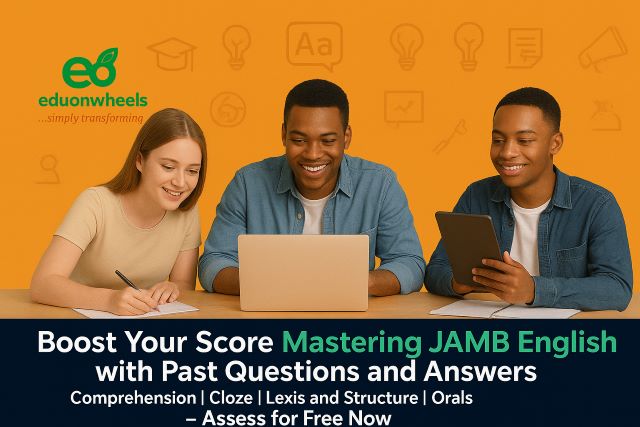






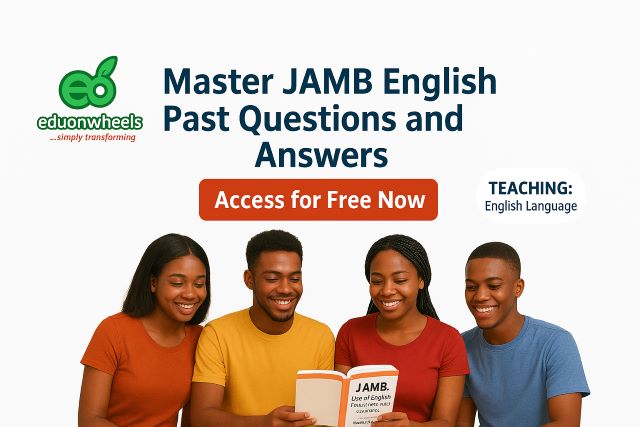
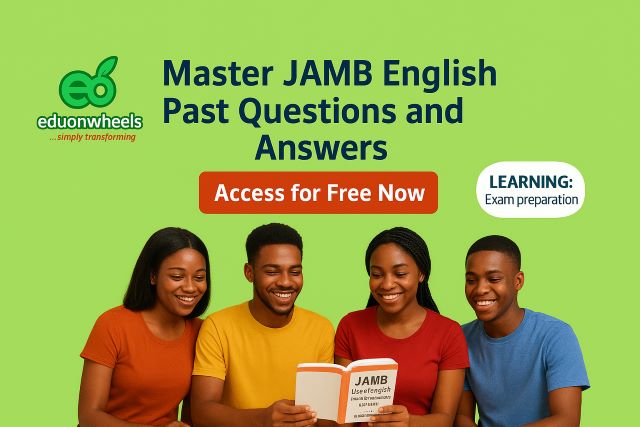
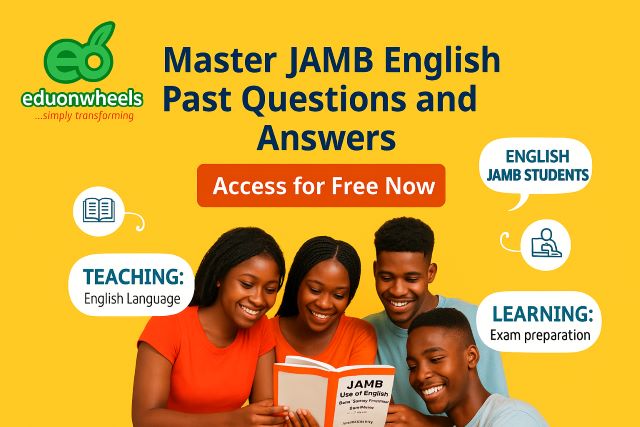
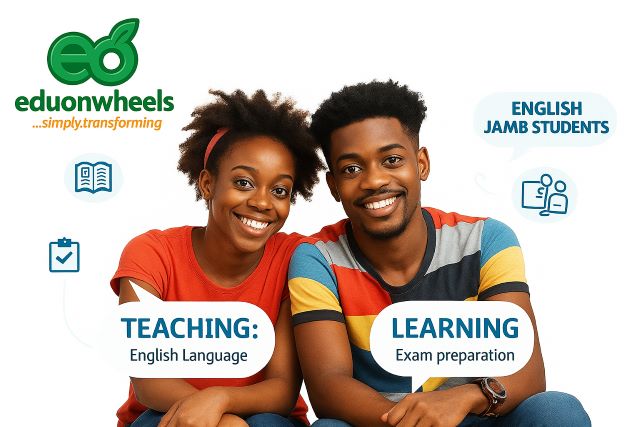




0 Comments